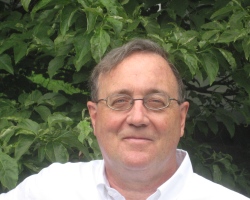Hatley Lectures on Ecological and Social Issues

In July, Hatley delivered the keynote address “” for an eco-humanities roundtable sponsored by Macqaurie University’s Center for Research for Social Inclusion in Sydney, Australia.
“Australia is feeling the pinch of global warming; a high rate of mammalian extinction is occurring there,” he said. “We explored how profoundly under threat the living world is and what the responsibilities of eco-humanists are in the emergence of the Anthropocene epoch, a time in which all aspects of our earthly surroundings are permeated by human demands. In opening the discussion, I questioned the mortality of our species as a whole and how assuming humans will always exist leads to ethical and metaphysical bad faith in our behavior toward the living world.”
The talk was among a host of addresses Hatley delivered recently on ecological and social issues.
“I want my philosophy and writing to reflect how humans are responsible not only to react to ills we confront but also to become witnesses for those who suffer from them. The human capacity for discourse, for open communication of our shared commitments requires that we speak sensitively and openly about others, both human and more than human. Whether addressing genocide or ecocide, we need to become attentive to how language itself affects how we understand the good and the harm we do.”
In June, he traveled to Canada to keynote the North American Levinas Society’s conference at the University of Toronto, discussing the influence of the poetry of Paul Celan, a survivor of the Nazi genocide, on the role of philosophy after the Holocaust.
The multi-talented Hatley enjoys crossing disciplines, exploring and combining diverse interests in environmental studies, religion, philosophy and art. “SU encourages scholars to take this sort of path,” he said. “We aren’t tied to one particular discipline, which allows creative voices to emerge.”
In March, he delivered the keynote address on “In the flesh: An apology for witnessing trees in environmental art” at a geo-aesthetics conference hosted by the International Association for the Study of the Environment, Space and Place. He has been invited to lecture in Florida and California on the relationship between naming and environmental responsibility. He also guest edited an edition of the Journal of Environmental Philosophy, which featured cover artwork by Adam Wier, a SU student.
Hatley earned his Ph.D. in philosophy from the State University of New York at Stony Brook, in addition to master’s degrees in literature and studio art from Middlebury College and the University of Montana, respectively. He has published works including Suffering Witness: The Quandary of Responsibility after the Irreparable and co-edited Interrogating Ethics. For more information call 410-543-6030 or visit the SU Web site at www.salisbury.edu.
